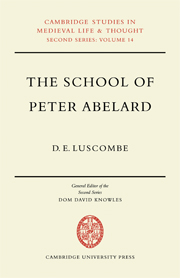Book contents
- Frontmatter
- Contents
- Preface
- List of Abbreviations
- I The Literary Evidence
- II Abelard's Followers
- III The Diffusion of Abelardian Writings
- IV The Condemnation of 1140
- V The Theological Writings of Abelard's Closest Disciples
- VI The School of Laon
- VII Hugh of St Victor
- VIII The Summa Sententiarum
- IX Abelard and the Decretum of Gratian
- X Abelard's Disciples and the School of St Victor
- XI Peter Lombard
- XII Robert of Melun
- XIII Richard of St Victor
- XIV Conclusion
- Appendices
- Bibliography
- Index of Manuscripts
- General Index
IV - The Condemnation of 1140
Published online by Cambridge University Press: 05 November 2011
- Frontmatter
- Contents
- Preface
- List of Abbreviations
- I The Literary Evidence
- II Abelard's Followers
- III The Diffusion of Abelardian Writings
- IV The Condemnation of 1140
- V The Theological Writings of Abelard's Closest Disciples
- VI The School of Laon
- VII Hugh of St Victor
- VIII The Summa Sententiarum
- IX Abelard and the Decretum of Gratian
- X Abelard's Disciples and the School of St Victor
- XI Peter Lombard
- XII Robert of Melun
- XIII Richard of St Victor
- XIV Conclusion
- Appendices
- Bibliography
- Index of Manuscripts
- General Index
Summary
An appreciation of Abelard's influence upon men's minds and upon their writings in the twelfth century must rest, at least in part, upon an understanding of how his contemporaries and successors discussed the content of his teaching, both logical and theological. How Abelard's logical teaching was received and developed will not be considered here; such a study would have to take into account a number of hitherto inedited texts which still await scientific study. It is fortunately more possible to consider Abelard's influence in theology and it is especially desirable to consider what those writers who most closely depended upon Abelard attempted themselves to do. Ever since Heinrich Denifle first revealed in 1885 the existence of such dependent writings, more and more texts by disciples of Abelard have been discovered and edited. These works are far from being merely the abridged reportings or the mirrored reflections of Abelard's own extant writings and we shall enquire how they presented or developed Abelard's theses and how some of them were stimulated by the criticisms of his opponents. The ways in which other active masters, too independent or eclectic to be classified as followers, continued to debate Abelard's opinions also require a historical examination. The fundamental concern of the following pages is, then, the role of Abelard's teachings in the evolution of early scholasticism. But first it is essential to appreciate the climate of controversy into which Abelard's principal teachings entered and to understand the reasons for which Abelard was condemned, justly or unjustly, in 1140. The teachings of Abelard's followers are barely comprehensible outside the context of Abelard's own difficulties.
- Type
- Chapter
- Information
- The School of Peter AbelardThe Influence of Abelard's Thought in the Early Scholastic Period, pp. 103 - 142Publisher: Cambridge University PressPrint publication year: 1969

